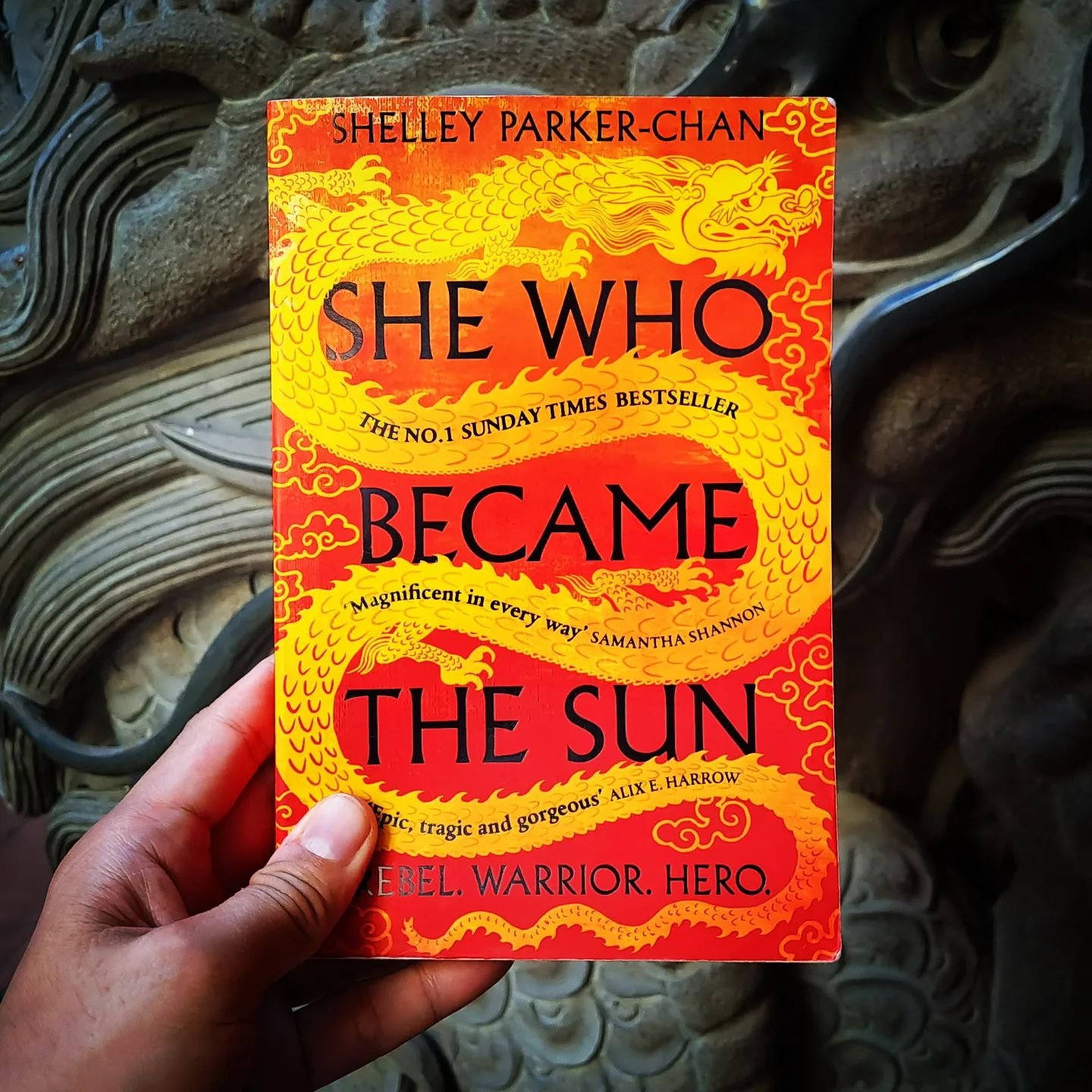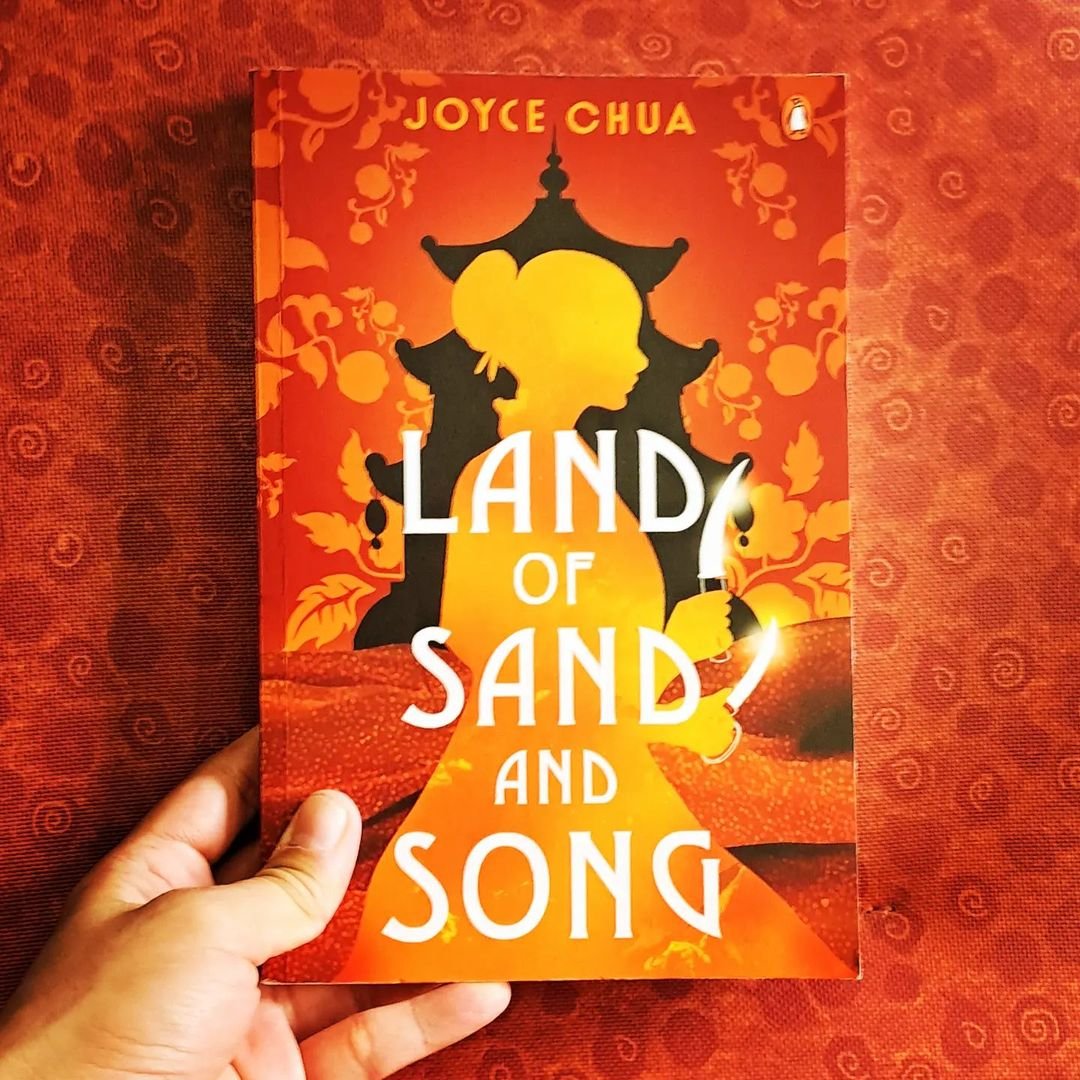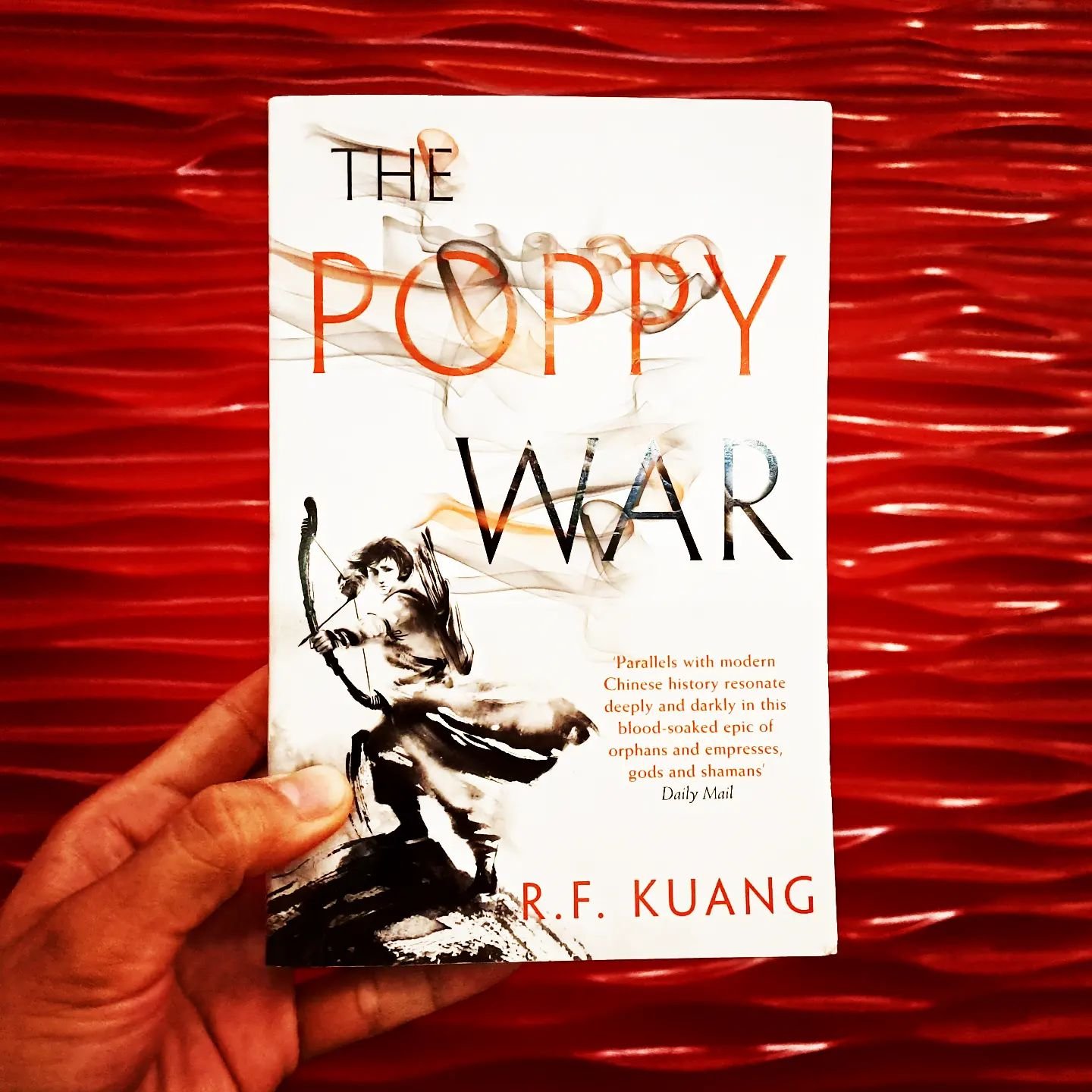#YISHREADS August 2022
By Ng Yi-Sheng / @yishkabob
This month, I’m tackling a more specific theme than usual: fantasy and science fiction novels inspired by Chinese history! This is arguably seasonally appropriate—I believe this’ll be published in between the Hungry Ghost Festival and the Mid-Autumn Festival?—but the truth is, I had a few of these books lying around my house already, and once I’d got through one, I decided to commit to barging through them all.
Readers may know that there’s a whole wave of Chinese history-inspired SFF going on right now, possibly sparked off by the success of Ken Liu’s The Grace of Kings in 2015: the work which kicked off The Dandelion Dynasty quadrilogy, styled after the rise of the Han Dynasty (202 BCE), and which first coined the term “silkpunk” [1] to describe an East Asian-based technology and literary aesthetic.
Author Xiran Jay Zhao, however, argues that the roots of this trend go much further back, since “historical fantasy is actually the number one genre in Chinese literary tradition.” [2] As examples, they cite 16th century Chinese novels such as Xu Zhonglin’s The Investiture of the Gods (set in the reign of King Zhou, r. 1075–46 BCE, the final ruler of the Shang Dynasty) and Wu Cheng-en’s Journey to the West (based on the travels of the monk Xuanzang, 602-64, of the Tang Dynasty).
For this selection, I’ve chosen works by five authors, all of Chinese descent, but each based in a different country or region: Canada, Hong Kong, Australia, Singapore and the USA. All except one of these writers is non-male (and A Hero Born was translated by a woman!) reflecting the way female and nonbinary writers are reshaping the patriarchal narrative of the past. And, partly by coincidence, I read them in the roughly chronological order of the periods of history that inspired them.
Should I do this again for other SFF genres—works inspired by the histories of South Asia, Southeast Asia, West Asia, etc? Comment below, if you have suggestions!
Iron Widow, by Xiran Jay Zhao
Oneworld Publications, 2021
I've been following the author on YouTube [3] for a while (their takes on Chinese history are fascinating and hilarious), and I'm pleased to report, as many others have, that their debut novel is just as delicious.
Folks are calling it a retelling of the story of Wu Zetian (r. 690-705), China's only female emperor, reimagined as a teenage mecha pilot—but as Zhao acknowledges themself, this isn't a documentary bound by fidelity to the actual historical record. Rather, this takes inspiration from multiple dimensions of Chinese heritage from different eras, from the names of characters and regions (strategists named An Lushan, Zhuge Liang and Sima Yi pop up; provinces are named after dynasties), patriarchal and racist traditions (foot-binding, ethnic minority groups viewed as barbarians), Taoist cosmology (the sci-fi systems are based on yin/yang and the Five Elements; the gods watch over the realm of Huaxia from their space station; the aliens are the Hundun from The Classic of Mountains and Seas). Even plenty of 21st century China trickles in, with Zetian understanding the power of media and unofficial bribery to manipulate the military into allowing her to survive.
I'm also struck by E. K. Johnston's description of this as "a primal scream of a book", because the story really is of a girl pushed by a patriarchy to go full Daenerys Targaryen—her willingness to risk the survival of her own life, her love and her family in the name of revenge from the beginning of the book is shocking, and her softening compassion turns out to be temporary—yet there's also this very Gen Z understanding that you can't just have this heroine emerge as a singular superwoman, but must also have her attempt to change the entire destructive misogynist system to help other women.
(MINOR SPOILER: I'm also quite delighted by how the classic YA love triangle is resolved with bisexual polyamory. Stephenie Meyer, your disciples have surpassed you.)
Among the recent wave of feminist Chinese history-inspired SFF novels, this might be the most sci-fi of the lot, which is kinda powerful—this combination of the cosmic, the semi-marginal historical epic and the political personal, all in one. Definitely looking forward to the sequel... and trying to mine this for ideas on how to retell Southeast Asian history!
A Hero Born, by Jin Yong
Translated by Anna Holmwood
MacLehose Press, 2018
Finally started on the first part of The Legend of the Condor Heroes / 射雕英雄传, first serialised between 1957 and 59! Alas, I never watched the TV shows and films this inspired, so I don't have the nostalgia others experience when reading this—nor the annoyance at finding that certain names are Anglicised in the translation.What is super-interesting is considering this in the context of Cold War history. Jin Yong's portrait of China in the 1200s, comrades divided between the Mongol steppes in the North and the Jurchen-controlled kingdom of the South, parallels the divide between the Communist PRC and British Hong Kong, with Guo Jing making a similar southward migration as the author.The numerous women among the martial artists—Jade Han, Iron Corpse, Lotus Huang, Mercy Mu, the thieves of the White Camel Mount—reflect the rising participation of women in all levels of the workforce, in both Communist and capitalist China, with no mention of the Song Dynasty practice of footbinding. Yet these women almost never serve as our POV characters, unlike the pregnant widows Lily Li and Charity Bao, and all of them are described as stunningly beautiful (something even my boomer dad laughs at!), reflecting the limits on Jin Yong's conceptions of the female.Also rather amusing how formulaic the story is—patriots end up turning on one another routinely, like they're the Fantastic Four; competitions and all-out brawls become cinematic opportunities for showing off fantastical kung fu moves... And of course, there's Guo Jing himself, the innocent everyman himbo, only a Chosen One because of a vow made by his guardians when he was in the womb, naturally clumsy but good-hearted, utterly unable to clock cross-dressing warrior maidens, but driven to supernatural levels of strength by encounters with Taoist mentors and elixir-bearing cobras in baskets. Every boy could dream of becoming such a bad-ass... whereas every girl had to wonder what the path was to becoming a bad-ass herself.
She Who Became the Sun, by Shelley Parker-Chan
Pan Books, 2022
The premise of this novel sounds nuts—what if Zhu Yuanzhang (r. 1368-98), the first Emperor of the Ming Dynasty, was actually a woman in disguise? Feels like you could try that with any historical figure—what if Napoleon had been secretly a woman? What if Shaka Zulu had been secretly a woman? What if Maggie Thatcher had been secretly a man?
Absurdities aside, however, this is a hell of a story. The fact that Zhu is constantly striving to hide part of her identity—not only from her fellow monks in the monastery and warriors in the Red Turban rebel army, but from the gods themselves as she seizes her dead brother's destiny—that just ups the stakes in the character's genuine historical journey from starving peasant to holder of the Mandate of Heaven in the war against the Yuan. (She won't become Emperor till Book Two, the author says!) Then there's the fact that there's a deuteragonist: a completely fictional eunuch general named Ouyang, who's taking down the Yuan from within, while suffering furious dysmorphia over his girlishly pretty face, while suffering for the genuine love of the Mongol prince Esen, whom he must betray.
Interestingly, this isn't markedly more fantastical than Jin Yong's Condor Heroes: the only SFF bits are the fact that ghosts are objectively real (Zhu can see them and ultimately manipulate them) and that the Mandate of Heaven manifests as a visible flame which its holders can command. What makes her novel unusually epic, I'd argue, is the fact that it's a tale of decades-long war across a vast terrain, resentments & stratagems festering and stewing, alliances and power relations shifting all the while (Iron Widow moves much faster, as befits a tale of upstart teens written by a 20-something)—AND that it's also fundamentally about a struggle against patriarchy, with all major characters manoeuvring against this hegemonic system (Jin Yong, alas, wasn't that woke). As a former diplomat and women's/LGBT rights worker, Parker-Chan's uniquely suited to writing this saga.
It's also very interesting that the novel's a finalist for the Lambda Literary Awards in Transgender Fiction. Zhu's referred to using female pronouns, unless the POV character isn't privy to her secret—yet she also realises at one point that she's neither entirely male nor female. I'd argue that the nomination's a recognition that Parker-Chan's trying to capture the complexity of historical Chinese gender diversity: how eunuchs and disguised women warriors (a whole trope in fiction, if not fact) represent gender categories that weren't the same as modern trans women and men, but still have a lasting legacy today.
(Anyway brb, gonna write a fanfic of LKY: the Musical in which Kwa Geok Choo, Lim Chin Siong and that trishaw uncle are all genderswapped and in feuding polycules.)
Land of Sand and Song, by Joyce Chua
Penguin Random House SEA, 2021
This here's a recent Singaporean take on Chinese history-inspired fantasy—and it's not bad! Sure, it's not as intense as Iron Widow or She Who Became the Sun, but that's partly cos it's a slow-burn murder mystery, an inter-dynastic conspiracy revealing itself before our eyes while a bunch of other interconnected plots progress.
The story doesn't map onto any specific historical reign or event, but we do see the oft-used trope of the "civilised" Han imperial city vs. the "barbarism" of the desert and mountains, populated by Mongols and other minority tribes. 17 year-old Desert Rose (oof, what an exoticised name) flees the Khuzar Desert after her chieftain father is deposed, training as a mercenary in Oasis City to seek an audience with the Emperor, while getting subtly love-triangled by two royal princes, Wei and Meng (it's not explicitly romantic, but always on the verge).
Interestingly, Chua's not terribly interested in confronting Chinese patriarchy. Women, if not equal to men, are represented as holding positions of power and agency: the Empress Wangyi is presented as a political advisor; Princess Qiu elopes of her own volition; the House of Night where Desert Rose trains has a full staff and student body of deadly female assassins.
Rather, it's the notion of nationhood she addresses. Desert Rose rebels during a history class, pointing out that Oasis City's founding myth is a lie, as the walled kingdom was built through the genocide and exclusion of magical beings and practitioners. Various peoples, especially the shouren (shapeshifting were-animals), are oppressed by the Emperor, whose only desire is to exploit magic to discover a quest for immortality. Those inside and outside the city shift allegiances and adopt each other's customs, complicit in rebellion. The ethnostate cannot hold.
And though this isn't a maritime kingdom fantasy (no mention of the sea, and even well water is a precious commodity), I can't help but see a glimpse of Singapore in this history. How our country, too, is defined by tyranny and exceptionalism—the ban on magic echoes our legacy of censorship of "yellow culture", from pinball machines and long hair to gay-themed movies—as well as a culture of intense competition, with Desert Rose's furious studying of texts and martial arts drills reminding me of a sick combination of the A-Levels and National Service.
This is just Book One of a series, mind you—all these books are!—so I don't know how this allegory's gonna hold up. Still, it's decent YA stuff. Check it out if you're super into this whole princes-and-pagodas genre!
The Poppy War, by R. F. Kuang
Harper Voyager, 2018
Damn—I've been reading Chinese history-inspired SFF novels for a month now, amazed at their brutality and violence, but none of that quite prepared me for this. This is 527 pages of grimdark trauma, winching higher and higher with each chapter, every moment of empowerment for our heroine Rin purchased at a terrible cost.Based on the title, I'd expected this to be a retelling of the Opium Wars (1839-42; 1856-60), and there is in fact an Empress (perhaps an analogue of Cixi, r. 1861-1908) on the throne. But the novel's actually more anchored in the Second Sino-Japanese War (1937-45), here waged between the Nikara Empire and the Federation of Mugen. (Not calling it World War Two, cos Kuang very deliberately removes Western powers from the action, saying the Hesperians have evacuated even the port cities during the invasion.) There's references to a Century of Humiliation, and horrors recognisably based on the Rape of Nanjing and Japanese biological warfare.
Fascinatingly, Kuang has stated in interviews that Rin's based on Mao Zedong (1893-1976). [4] Yep, we have another genderswapped historical figure on our hands, just like She Who Became the Sun!—but the inspiration is loose, and gender, while it matters, isn't the most important obstacle on her path to greatness. She basically goes on a speedrun of all seven H*rry P*tter books, from being an outcast orphan to entering and acing Sinegard Academy for military leaders (she has to work her ass off, though; no-one believes she's the chosen one) to becoming a magical teen soldier in the battle against evil... though the end takes us well into Alan Moore’s League of Extraordinary Gentlemen, Volume III: Century treatment of P*tter, where he turns out to be the Antichrist! Seriously, a lesser author would've made each segment of Rin's journey a separate book—I kept thinking we were headed for a conclusion, only to have the action amped up yet another level.Then there's the treatment of magic. Unlike most Chinese SFF tales, this one takes place in a scientistic world where most people don't believe in fantastical forces—the Mugenese actually use poison gas attacks and lab experimentation, and the martial arts teachers at Sinegard scoff at qi and say battle is all about trigonometry. When magic's revealed through Jiang, the classic wise fool of a teacher, we're first shown the arduous path that it requires, then the doom it breeds—a good reason why more people don't use it. (I have, alas, started to see some clichés in the pagodas-and-princes genre: embodiments of Sun Wukong, invocations of The Classic of Mountains and Seas, the Five Elements as a basis for magic. But one could say much the same of most Tolkienesque Western fantasy.)Btw, with regards to the title: opium itself features prominently, named as such, not disguised under a fictional name like Moloko Plus or Spice. And it's not just a plague and a source of black market profit, but a channel for shamans to speak to the gods, and eventually a valid means to cope with pain.This is a book that takes addiction seriously, not just to drugs, but also to power, to success based on the simple justification that one must do anything necessary to survive. It's clear Kuang's directing this at China, too, lest people imagine that depicting Japanese atrocities makes her an apologist for nationalism. Why not fail and die?, she asks us. It may be a better option than becoming a monster.
Endnotes
[1] https://kenliu.name/books/what-is-silkpunk/
[2] https://xiranjayzhao.tumblr.com/post/676299356621635584/how-putting-historical-figures-in-giant-mechas-in
[3] https://www.youtube.com/c/XiranJayZhao?app=desktop
[4] https://www.npr.org/2020/11/24/937995479/in-the-poppy-war-series-r-f-kuang-asks-what-if-mao-was-a-teenage-girl
Ng Yi-Sheng (he/him) is a Singaporean writer, researcher and LGBT+ activist. His books include the short story collection Lion City and the poetry collection last boy (both winners of the Singapore Literature Prize), the non-fiction work SQ21: Singapore Queers in the 21st Century, the spoken word collection Loud Poems for a Very Obliging Audience, and the performance lecture compilation Black Waters, Pink Sands. He recently edited A Mosque in the Jungle: Classic Ghost Stories by Othman Wok and EXHALE: an Anthology of Queer Singapore Voices. Check out his website at ngyisheng.com.
If you’ve enjoyed reading this article, please consider making a donation. Your donation goes towards paying our contributors and a modest stipend to our editors. Singapore Unbound is powered by volunteers, and we depend on individual supporters. To maintain our independence, we do not seek or accept direct funding from any government.














This Pride month, Ng Yi-Sheng reviews five queer comic titles bringing readers from the Philippines to Indonesia, Japan to Singapore, and to the USA.